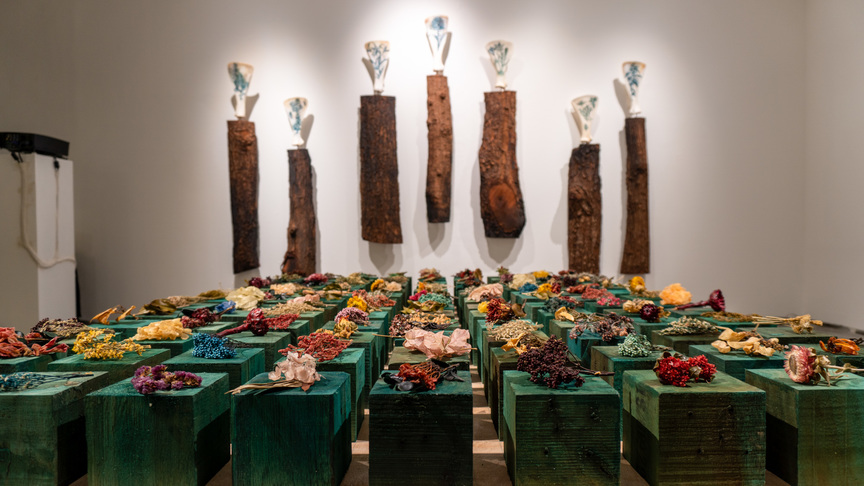-
From Current Issue
-
- Editor’s Letter Fire in the Heart
- Reviews I Gusti Ayu Kadek Murniasih
- Reviews 11th Seoul Mediacity Biennale: “One Escape at a Time”
- Dispatch Networked China
- One on One Monira Al Qadiri on Yukio Mishima
- Essays The rise of independent art spaces in pandemic-era Shanghai
- Features Tuan Andrew Nguyen
- Table of Contents
- Web Exclusives
- Archive
- Subscribe

R
E
V N
E
X
T
GERALDINE JAVIER, Gertrude Jekyll (The Earth was Her Canvas II), 2020, acrylic on canvas, 182.9 × 198.1 cm. All images courtesy Artinformal Gallery, Manila.
“Five Gardens,” Geraldine Javier’s solo exhibition at Artinformal Makati, was a continuation of the artist’s inquiry into our relationship with nature—a theme she began to explore after she moved to a two-hectare plot of farmland in Batangas, a province south of Metro Manila, in 2013. In the show, Javier responds to four artists who were also passionate gardeners—Claude Monet (1840–1926), Gertrude Jekyll (1843–1932), Frida Kahlo (1907–54), and Derek Jarman (1942–94)—and wonders why gardening was important to them, as it is to her.
The catalogue includes a quote by Jekyll: “In setting a garden we are painting a picture, only it is a picture of hundreds of feet or yards instead of so many inches, painted with living flowers and seen by open daylight.” This description appears to invigorate Javier’s painting series Gertrude Jekyll (The Earth was Her Canvas) (2020), wherein vast and variegated floral labyrinths are layered with diaphanous, shimmering glazes and haunted by shadowy figures either cast on the foliage or engulfed by mist.
Similarly, a spectral figure suggested by leaves and stems appears in Monet in the Land of Red Poppies (2020), one of the four Monet-inspired paintings in the show. Unlike the densely packed compositions in the Jekyll series, these feature atmospheres of vibrant pastel clouds, splatters, encaustic drips, and glistening powders that envelop red poppies, water lilies, and tulips.
Near this series was The Two Fridas (2020–21), an installation of ten silk organza banners. Taking cues from Kahlo’s original The Two Fridas (1939), a painting she completed shortly after her divorce with Diego Rivera, Javier’s frontmost banner showed two outlines of Kahlo—often interpreted as symbolizing the Mexican artist’s inner conflict—with their exposed hearts sharing an elongated artery. Surrounding them are images of the pets and plants in Kahlo’s La Casa Azul garden, such as monkeys, birds, deer, cacti, and sunflowers.
It may initially seem as though Javier is simply crafting anodyne but nonetheless sensorially delightful scenes, yet these works take on a different tenor in light of the gothic sensibility of earlier pieces that ruminate on death. Javier could have been partly interested in the artists’ personal tragedies and, by reinterpreting a biographically charged work like Kahlo’s The Two Fridas or employing various optical effects like shrouds and camouflage in the Jekyll and Monet series, seeking to understand how gardening might have offered Kahlo refuge amidst her deteriorating relationship or uplifted Jekyll, Monet, and Jarman as they all coped with their declining eyesight.
Bones for Jarman (2021), a sculptural series made of charred wood and engraved cow pelvic bones, more blatantly gestures toward the subject of death and decay. Engraved on the bones are intricate floral illustrations, poignantly rendered in the titular shade of Jarman’s last film, Blue (1993), which was inspired by the director’s inability to see any other color due to his AIDS-related partial blindness.
Surrounding Bones for Jarman were other memento mori, including a video of maggots; a collection of 117 dried flowers titled In Memory of (2021); and, most notably, Words for Everyone (2021), a piece that perhaps encapsulates Javier’s outlook. In stark contrast to the lush, luminous, and lyrical pieces on display, Words for Everyone consists of wooden planks, charred ash black, on which a quote by ecologist Robin Wall Kimmerer is engraved: “Even a wounded world is feeding us. Even a wounded world holds us, giving us moments of wonder and joy. I choose joy over despair. Not because I have my head in the sand, but because joy is what the earth gives me daily and I must return the gift.”
Visible from the entrance, this work was a constant, sobering reminder. Although the recurrent theme of apparitions and illness may register as a warning of impending doom on a dying Earth, the exhibition called for action not through images of despair but by expressing the complexity of our relationship with nature, one which can be either reciprocally nourishing or mutually destructive. A memento mori on a planetary scale, “Five Gardens” was both urgent and enthralling.
Geraldine Javier’s “Five Gardens” was on view at Artinformal Gallery, Makati, Metro Manila, from July 13 to August 17, 2021.
To read more of ArtAsiaPacific’s articles, visit our Digital Library.













